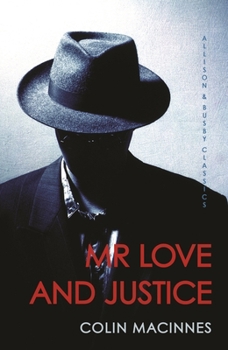Book Overview
Frankie Love, new to his profession as a ponce, seems to run his illegal life on strictly fair principles. Ted Justice, recently appointed member of the vice squad, finds his upholding of the law complicated by love for his girl... Love is travestied in the activities of the prostitute, justice mocked in the procedure of the vice squad, as Colin MacInnes writes with an authenticity which only an intimate knowledge of the seamier side of life can deliver. It is a world in which motives, friendships and values are never as simple as they seem. MacInnes is a fascinating author who throws much light upon multi-cultural London life at the dawn of the 1960s.
Format:Paperback
Language:English
ISBN:0749011483
ISBN13:9780749011482
Release Date:July 2012
Publisher:Allison & Busby
Length:286 Pages
Weight:0.45 lbs.
Dimensions:0.8" x 5.1" x 7.7"
Customer Reviews
1 rating
The Undiscovered Country on His Doorstep
Published by Thriftbooks.com User , 15 years ago
This is the third of Colin MacInnes' London novels, often referred to as the "London Trilogy" even though each novel is a self-contained story with no connection with, or characters in common with, the other two. Each deals with a separate aspect of London life during the late fifties and early sixties: "City of Spades" with the city's growing immigrant communities, "Absolute Beginners" with the growth of youth culture and "Mr Love and Justice" with the city's underworld. The title derives from the two central characters. Frankie Love is an unemployed merchant seaman who, unable to find work, becomes a pimp living off the immoral earnings of his prostitute girlfriend. Edward Justice is a young policeman recently transferred from the uniformed branch to the Metropolitan Police's vice squad. The two, who just happen to be neighbours in the same block of flats in Maida Vale, become involved when Edward is assigned to investigate the case of a valuable snuff box which Frankie's girlfriend has, allegedly, stolen from a client. There is an obvious irony in their names. Mr Love's occupation involves a travesty of love, or at least of sex. Given that the vice squad for which he works is portrayed here as being thoroughly corrupt, Mr Justice's occupation involves an equal travesty of justice. Yet neither character is completely unsympathetic. Mr Love, who believes in honour and fair play, retains a certain belief in justice, whereas Mr Justice has an idealistic belief in romantic love, being prepared to put his police career in jeopardy for the sake of his girlfriend, of whom his superiors strongly disapprove on account of her father's previous criminal convictions. MacInnes' view of the police is a jaundiced one. Although Edward is caught up in the general web of corruption, he is relatively innocent in comparison with his cynically dishonest colleagues, who will not hesitate to manufacture evidence if they think it will assist in obtaining a conviction or to use violence against suspects. Although they profess to hate vice and prostitution, they are not above taking "protection money" from wealthy or influential pimps or madams. There may be honour among thieves, but in MacInnes' view there was little among bent coppers, who are always ready to "shop" a colleague if it serves their own interests. This view of the police as self-serving and corrupt has since become something of a cliché in fiction and television drama, especially since public confidence in the force was damaged by a series of scandals, such as the "Guildford Four" and "Birmingham Six" cases, in which police misconduct led to well-publicised miscarriages of justice. In 1960, however, such depictions were rare. At this period the British public had a very rosy view of the police force, and to many Britons the archetypal "bobby" was Sergeant George Dixon, the upstanding, fearless and incorruptible (but unfortunately fictitious) hero of the long-running TV series "Dixon of






